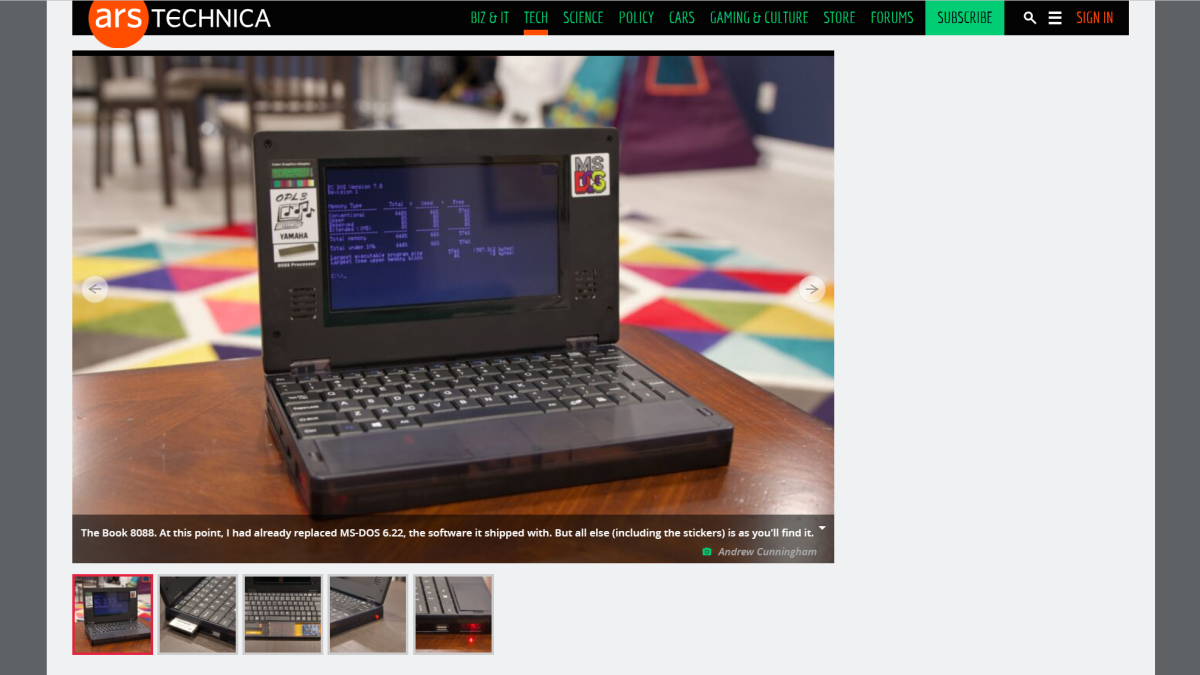This funky ‘modern’ laptop recreates the IBM PC 5150—sort of
Perhaps modern computing just isn’t thrilling you currently. (I know I have my complaints with it.) If that’s the case, a new laptop that celebrates the old, by repackaging a slice of early 1980s desktop computing into a clamshell form factor, might give you a fresh perspective.
Called the Book 8088, this netbook-sized PC isn’t a pure reproduction of the storied IBM Personal Computer 5150. Instead, it combines genuine original parts (that iconic Intel 8088 chip) with newer hardware to recreate the IBM 5150’s specs while squeezing the guts into a much smaller footprint. And not only did Ars Technica get hands-on time with one, Ars Technica senior technology reporter Andrew Cunningham spent considerable time studying its ins and outs.
Ars Technica’s chronicle of purchasing and using the Book 8088 is a fascinating blend of technical details and nostalgia—especially for me, as my first PC was technically an IBM PC 5150. With a clock speed of 4.77MHz, the Book 8088 crawls along compared to today’s computers, but in its time the 8088 made previously time-consuming tasks much faster and easier. The main piece of software that my uncle bought for that 5150 before abandoning it to me and my cousins to play with? A spreadsheet program—Lotus 1-2-3, if memory serves.

Ars Technica
But the experience isn’t a perfect one, much less smooth. As Cunningham details, this $200 AliExpress laptop is a bit of a Frankenstein’s creation, one that seems less a product spun up by a business looking to move machines and more of a hobbyist selling their side project. With a modern PC, you might also have problems with memory not being recognized properly on boot, but it doesn’t take a soldering iron to fix it. Nor will you be running a bootleg BIOS and copies of Windows 3.0 and MS-DOS 6.22 not meant for use in actively sold products. Today’s laptops also have speakers that work and bright LCD screens with good viewing angles.
Still, this glimpse 40 years into the past is mesmerizing. You can see just how far we’ve come—and how much love and care people have for the past. That stolen BIOS software? After being contacted by Cunningham, the original creator eventually put out a new version that officially supports the Book 8088 and provides improvements to its performance (like disk transfer speeds). You can also see how spoiled we are by people who fix older software to work on contemporary hardware (or at least make such versions easily accessible—hi, GOG). Part of the deep dive into using the Book 8088 covers the issue of software compatibility; programs written and tuned for the IBM 5150’s original specs can crash on the Book 8088.
But if this initial account of using the Book 8088 isn’t enough of a nostalgia hit for you, there’s good news: Ars Technica will be publishing a part two to the piece, which covers how to tune the Book 8088 and make it useful.
For all the latest Technology News Click Here
For the latest news and updates, follow us on Google News.

